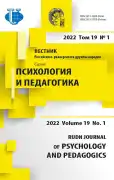Grant Support as a Research Development Factor in Russian Universities
- Authors: Ebzeeva Y.N.1
-
Affiliations:
- Peoples’ Friendship University of Russia (RUDN University)
- Issue: Vol 19, No 1 (2022)
- Pages: 146-157
- Section: CURRENT TRENDS IN PERSONALITY RESEARCH
- URL: https://journal-vniispk.ru/2313-1683/article/view/326124
- DOI: https://doi.org/10.22363/2313-1683-2022-19-1-146-157
- ID: 326124
Cite item
Full Text
Abstract
Scientific research at the present stage of development of higher education is the basis of the academic reputation of the university, an aspect of the educational activities of the teacher and student. Quantitative indicators of scientific performance are the most important criterion for evaluating effectiveness at different levels. The article analyzes the implementation of scientific research based on grant support for four of the most authoritative foundations in Russia in 2006-2020: the Russian Foundation for Basic Research, the Russian Humanitarian Science Foundation, the Council for Grants of the President of the Russian Federation and the Russian Science Foundation. The assessment was made on the example of projects in the humanities and social sciences, including linguistics. The conclusion of the study introduces a statement of the importance of funds for the preservation of classical areas of scientific activity. It also demonstrates the necessity of an increase in the number of scientific research at Russian universities funded by these funds both in general terms and in relation to the number of grant projects conducted at academic institutions and an assessment of the activities of funds as a structure that determines priority directions of research. The most popular contests for universities have become contests in the areas of fundamental research and research support for young scientists.
About the authors
Yulia N. Ebzeeva
Peoples’ Friendship University of Russia (RUDN University)
Author for correspondence.
Email: ebzeeva-yun@rudn.ru
ORCID iD: 0000-0002-0043-7590
PhD in Philology, is Associate Professor, First Vice-Rector - Vice-Rector for Education, Head of Foreign Languages Department, Faculty of Philology
6 Miklukho-Maklaya St, Moscow, 117198, Russian FederationReferences
- Belenitskaya, O. (2017). We have no future without science. World of Science, 9, 2–7. (In Russ.)
- Ebzeeva, Y., Dugalich, N., Nakisbaev, D., & Levshits, A. (2019). Breaking through in subject rankings: IMLICaM Experience. Proceedings of ICERI2019 (pp. 4239–4243). Seville: IATED. https://doi.org/10.21125/iceri.2019.1057
- Ebzeeva, Y., Dugalich, N., Nakisbaev, D., & Levshits, A. (2021). Modern languages and linguistics: Climbing up world university rankings. IMLICaM know-how. Proceedings of EDULEARN21 (pp. 8667–8672). Palm: IATED. https://doi.org/10.21125/edulearn.2021.1749
- Ebzeeva, Y.N. (2021). QS Subject Focus Summit 2020 on Modern Languages and Linguistics: Languages and migration in a globalized world. Russian Journal of Linguistics, 25(2), 299–316. https://doi.org/10.22363/2687-0088-2021-25-2-299-316
- Gokhberg, L.M., Ditkovsky K.A., Evnevich, E.I., et al. (2021). (Eds.). Science indicators: 2021: Statistical collection. Moscow: Higher School of Economics. (In Russ.)
- Heyard, R., & Hottenrott, H. (2021). The value of research funding for knowledge creation and dissemination: A study of SNSF Research Grants. Humanities & Social Sciences Communication, 8, 217. https://doi.org/10.1057/s41599-021-00891-x
- Ilyina, I.E. (2015). Analysis of the activities of scientific foundations that provide support for fundamental research in Russia. Science Management and Scientometrics, (18), 179–203. (In Russ.)
- Ivanov, E.E., Lomakina, O.V., & Petrushevskaya, J.A. (2021). The national specificity of the proverbial fund: Basic concepts and procedure for determining. RUDN Journal of Language Studies, Semiotics and Semantics, 12(4), 996–1035. (In Russ.) https://doi.org/10.22363/2313-2299-2021-12-4-996-1035
- Kostomarov, V.G. (1996). Philologists master grant funding. Bulletin of the Russian Foundation for the Humanities, (3), 20–22. (In Russ.)
- Krukovskaya, N.V., & Chovnikova, N.G. (2017). Monitoring of publications of the results of scientific activities under RFBR grants. Culture: Theory and practice. Information and Innovations, (6), 66–70. (In Russ.)
- Lukasheva, E.A. (2007). Grantovaya podderzhka gumanitarnyh issledovanii. Science Governance and Scientometrics, (3), 149–153. (In Russ.)
- Neufeld, J., Huber, N., & Wegner, A. (2013). Peer review-based selection decisions in individual research funding, applicants’ publication strategies and performance: the case of the ERC starting grants. Research Evaluation, 22, 237–247. https://doi.org/10.1093/RESEVAL/RVT014
- Novikova, I.A., Novikov, A.A., & Shlyakhta, D.A. (2021). Acculturation scale to Russia for Chinese students: Development and psychometric verification. RUDN Journal of Psychology and Pedagogics, 18(4), 801–824. (In Russ.) https://doi.org/10.22363/2313-1683-2021-18-4-801-824
- Poroshina, T. (2020). To the matter of personal initiatives: The experience of postgraduate student’s participation in scientific contests. Culture and Arts Herald, (1), 99–101.
- Reale, E. (2017). Analysis of national public research funding (PREF) – final report. Technical Report JRC107599. Luxembourg: Publications Office of the European Union.
- Semyonov, E.V. (2007). Grants in Russian science: Experience of the Russian foundation for the humanities. Science Governance and Scientometrics, (3), 227–252. (In Russ.)
- Severin, A., Martins, J., Heyard, R., Delavy, F., Jorstad, A., & Egger, M. (2020). Gender and other potential biases in peer review: Cross-sectional analysis of 38250 external peer review reports. BMJ Open. http://doi.org/10.1136/bmjopen-2019-035058
- Sohn, E. (2020). Secrets to writing a winning grant. Nature, (577), 133–135. https://doi.org/10.1038/d41586-019-03914-5
- Voronetskaya, L.G. (2021). Creation of funds to support scientific research as one of the mechanisms of attracting youth in university science. Bulletin of Prikamsky Social Institute, (1), 63–69. (In Russ.)
- Vorotnikov, Yu.L. (2009). Russian Humanitarian Science Foundation and humanities in modern Russia. Universum: Bulletin of the Herzen University, (1), 3–8. (In Russ.)
- Wang, Y., & Remchukova, E.N. (2021). Development of the advertising specialty in higher education in Russia and China. RUDN Journal of Psychology and Pedagogics, 18(3), 532–554. (In Russ.) https://doi.org/10.22363/2313-1683-2021-18-3-532-554
- Zubov, O.E., Ezhova, V.V., Pinyaeva, T.N., Chatkina, M.G., & Yunusova, L.A. (2014). Participation of scientists of the Mordovia State University in competitions held by the Russian Foundation for the Humanities. Regionology, (1), 60–65. (In Russ.)
Supplementary files









